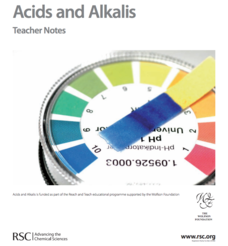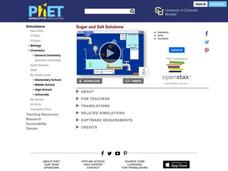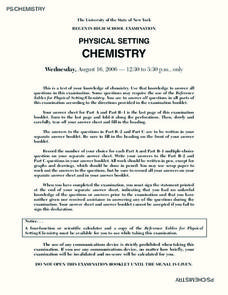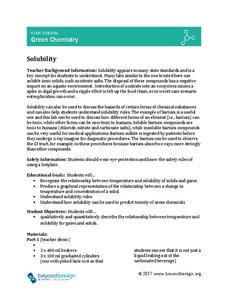Royal Society of Chemistry
Acids and Alkalis—Gifted and Talented Chemistry
Looking for a comprehensive plan for teaching acid-base chemistry? Science scholars discover acid-base interactions through a thoughtfully written unit. The resource is divided into paced activities and individual work designed to...
Towson University
Looking Into Lactase: Guided Inquiry
Milk does a body good ... unless, of course, someone is lactose intolerant. Pupils play the role of pharmaceutical scientists in a guided inquiry lab about lactase. Lab groups collaborate to learn more about lactose intolerance, how...
PhET
Sugar and Salt Solutions
Ionic bonds form from electrostatic energy, allowing for higher conductivity than those seen in covalent bonds. In the simulation, learners add sugar and salt to water and see the effects on concentration and conductivity of their...
Virginia Department of Education
The Rate of a Chemical Reaction
If your pupils think a catalyst is a list of their cats, then this might be the lesson for you! Young chemists study the effect of temperature, catalysts, concentration, and particle size on reaction rates during four different...
Curated OER
2007 U.S. National Chemistry Olympiad Local Section Exam
Sixty multiple choice questions cover the entire gamut of chemistry concepts. This is the local section of the U.S. National Chemistry Olympiad, where your chemistry candidates take a shot at entering the national competition. They...
Curated OER
Using the Spectrophotometer to Analyze a Mixture
General chemistry classes practice spectroscopy. They grasp the relationships between wavelength, absorbance, and solution concentration. Additionally, they gain valuable practice using laboratory equipment such as burets and pipettes....
Curated OER
Hydrogen Peroxide Analysis
A scenario is presented for chemistry techs to address. Using titration techniques, they must analyze hydrogen peroxide solution samples. They evaluate accuracy and precision in the process. They also gain experience consulting the MSDS...
Curated OER
The Visible Spectroscopy Expert Witness Problem
In a simulated crime science investigation, chemistry or physics sleuths use spectroscopy to analyze solutions. The lesson gives learners practice making salicylate solutions, using spectrophotometers, calculating dilution amounts,...
Curated OER
2002 U.S. National Chemistry Olympiad National Exam - Part I
As to be expected from the American Chemical Society Olympiad Examinations Task Force, this 60-question test tops the charts in terms of excellence. It consists entirely of multiple choice questions designed to assess a year's worth of...
Curated OER
2000 U.S. National Chemistry Olympiad National Exam - Part I
The National Chemistry Olympiad exams are comprehensive tests covering an entire year of chemistry concepts. You can use them as practice for competing in the challenge, or simply as a review, or as an actual final exam for your...
Curated OER
2009 U.S. National Chemistry Olympiad National Exam - Part I
The 2009 version of the first part of a national chemistry competition is posted for your use with olympiad hopefuls. Test takers deal with 60 multiple choice questions covering an entire year of chemistry curriculum. Use this to...
Curated OER
Adapting the Game Concentration
I love classroom games, and this plan deftly describes how you can use the game Concentration across the curriculum to reinforce skills. I wish I would have thought of this when I was teaching this age level. These kinds of games are...
Curated OER
Identifying and Explaining Reactions
Introduce high schoolers to chemical reactions with this series of activities. In a little over an hour, scientists observe four gas-producing reactions: the combination of hydrochloric acid and sodium hydroxide, placing pasta in...
Curated OER
Regents High School Examination PHYSICAL SETTING CHEMISTRY 2006
The 2006 version of the Regents High School Exam is just as thorough as the rest of them! Assess chemistry learners on an entire year's curriculum when they take this thirteen page test.
Curated OER
Analysis of the Concentration of Sodium Chloride in a Product
High schoolers design an experiment to test for the concentration of chloride in products. In this analysis of chloride concentration lesson plan, students develop and conduct an experiment to find the amount of chloride ion in a...
Beyond Benign
Solubility
Enhance your class' ability to understand solubility. Science scholars examine how temperature and concentration affect solubility using an interesting lab experiment. The introduction and procedure also discuss the relationship between...
College Board
2017 AP® Chemistry Free-Response Questions
More than 83,000 scholars earned college credit, thus saving time and money by passing the AP Chemistry exam in 2017. Use the exact test questions covering concepts from activation energy to solubility to prepare for the upcoming...
Kenan Fellows
Solutions
Scientists require specific chemical solutions for their experiments. In the seventh and final installment in a series that integrates chemistry and algebra II, scholars learn to set up a system of equations to solve the volume of a...
Nuffield Foundation
Making a Calibration Curve for Starch Concentration
How well can your class concentrate on solutions? Scholars use colorimeter absorption to explore a starch concentration calibration curve. They add iodine to different starch solutions to see how the concentration of the solution changes.
Chemistry Collective
Virtual Lab: Unknown Silver Chloride
You'll need to concentrate on the concentration lab to get it done. Given a virtual beaker with a silver chloride solution of unknown concentration, scholars find the silver ion concentration in the solution. Of course, they must show...
Chemistry Collective
Virtual Lab: Standardization of NaOH with a KHP solution: Acid Base Titration
This is not your standard standardization lab! Take titration into the high-tech age with a simulated workbench. Learners perform titrations to standardize a sodium hydroxide solution using a KHP solution of unknown concentration....
Chemistry Collective
Virtual Lab: Creating a Buffer Solution
Buffers don't just magically appear in the stockroom when you need them! Give learners a crash course in buffer basics using an interactive lab assignment. Individuals are tasked with creating a buffer with a certain pH that will react...
Chemistry Collective
Virtual Lab: Unknown Acid and Base Problem
Looking for an easy way to give your class experience with acid-base chemistry outside the lab? Try a detailed interactive that puts them in total control! Young chemists determine the dissociation constant and concentration of an...
Chemistry Collective
Virtual Lab: Determining the pKa and Concentration Ratio of a Protein in Solution
It's pretty common to determine the dissociation constant for an acid or a base ... but, what about a protein? Challenge your class with a virtual lab designed to further develop their acid-base chemistry skills. Individuals determine...

























